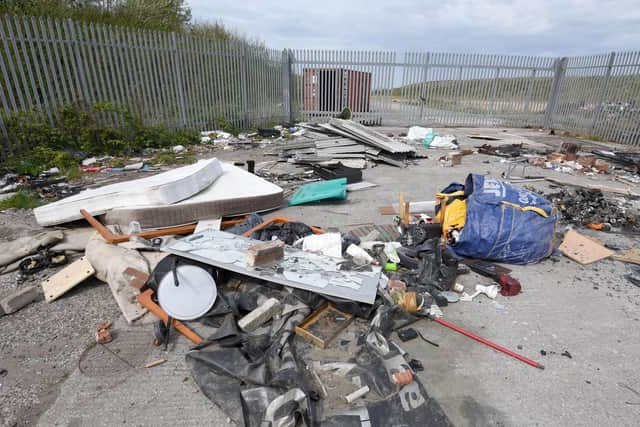Don't DIY! - Fly-tipping increases as council's ask Fylde coast residents to reconsider their home and garden projects
and live on Freeview channel 276
Wyre Council said that it is difficult to gather figures on the amount of fly-tipping incidents, however the council has seen an increase. It’s also asking residents to think before starting projects about the waste leftover.
A spokesman said “We often see patterns at this time of year with people carrying out DIY and garden projects. Adding to this, many more people are at home and creating more waste and we have seen a small increase in the amount of fly tipping incidents.
Advertisement
Hide AdAdvertisement
Hide Ad“Despite the reduction of staffing levels due to the pandemic, our crews are responding to reports of fly tipping, carrying out investigations as to where the waste came from and issuing fixed penalty notices.


“We would like to remind residents that now is not the time to start a DIY or garden project, unless you have somewhere to store the waste. If you do employ someone to collect and dispose of your waste, follow the SCRAP rules, suspect all waste carriers, check their registration details, refuse unexpected offers to take waste, ask what will happen to your waste and paperwork should be obtained.
“Residents can also help make our waste collections run smoothly by wiping the handles of bins to prevent the spread of germs and create extra room in their recycling bins by washing and squashing items.”
Fylde Council also said it had have had a number of fly-tipping incidents reported to them which they are investigating.
Advertisement
Hide AdAdvertisement
Hide AdA spokesman said: “We currently have 40 fly tipping complaints recorded on our system but this isn’t the final number for the period requested.
“At this time, Fylde Council will continue to investigate fly tipping, take further enforcement action were appropriate and remove fly-tipping from public land.”
The spokesman added: "During extra time at home, you may be considering completing some DIY around the home, having a clear out or sprucing up the garden. Please remember that all Household Recycling Centres are closed, so you must consider how you intend to store any additional rubbish you produce.
"Please delay any big house/garden projects for the time being. Also please do not leave any rubbish outside the Household Waste Recycling Centre (Lytham tip), local recycling bring sites, charity shops or elsewhere.
Advertisement
Hide AdAdvertisement
Hide Ad"This is classified as fly tipping and is a criminal offence that you could be prosecuted for. Clearing any waste which has been dumped takes our already stretched staff away from more essential tasks such as emptying household bins."
Steve Scott, head of waste management for Lancashire County Council which controls Fylde and Wyre’s tips, said that the county’s waste facilities were closed “in line with government advice” in order to keep the public and staff safe.
He added: “We are currently considering options for how we may be able to reconfigure the way our sites operate to offer a limited service for people once the current lockdown is lifted, along with measures which are likely to be needed to manage demand whenever the sites reopen.
Blackpool Council said it did not comment on fly-tipping incidents and added that it has no plans to reopen the Bristol Avenue recycling centre currently but added that the situation is ‘evolving’ all the time.
Advertisement
Hide AdAdvertisement
Hide AdDespite the increase in fly-tipping a poll conducted by a waste collection firm found none of the 128 polled council representatives said they considered a trip to the household waste and recycling centre (HWRC) “essential” under current regulations.
The poll by recycling and waste management firm SUEZ recycling and recovery UK gauged the opinion of 128 local authority representatives during a webinar on safe operation of
HWRCs.
Of the ones who participated in the polls during the webinar, none believed that ‘under current regulations’ a trip to a HWRC was ‘essential’ and 72 per cent of the representatives thought that it would take between one and three weeks to ‘remobilise one or more HWRCs’.